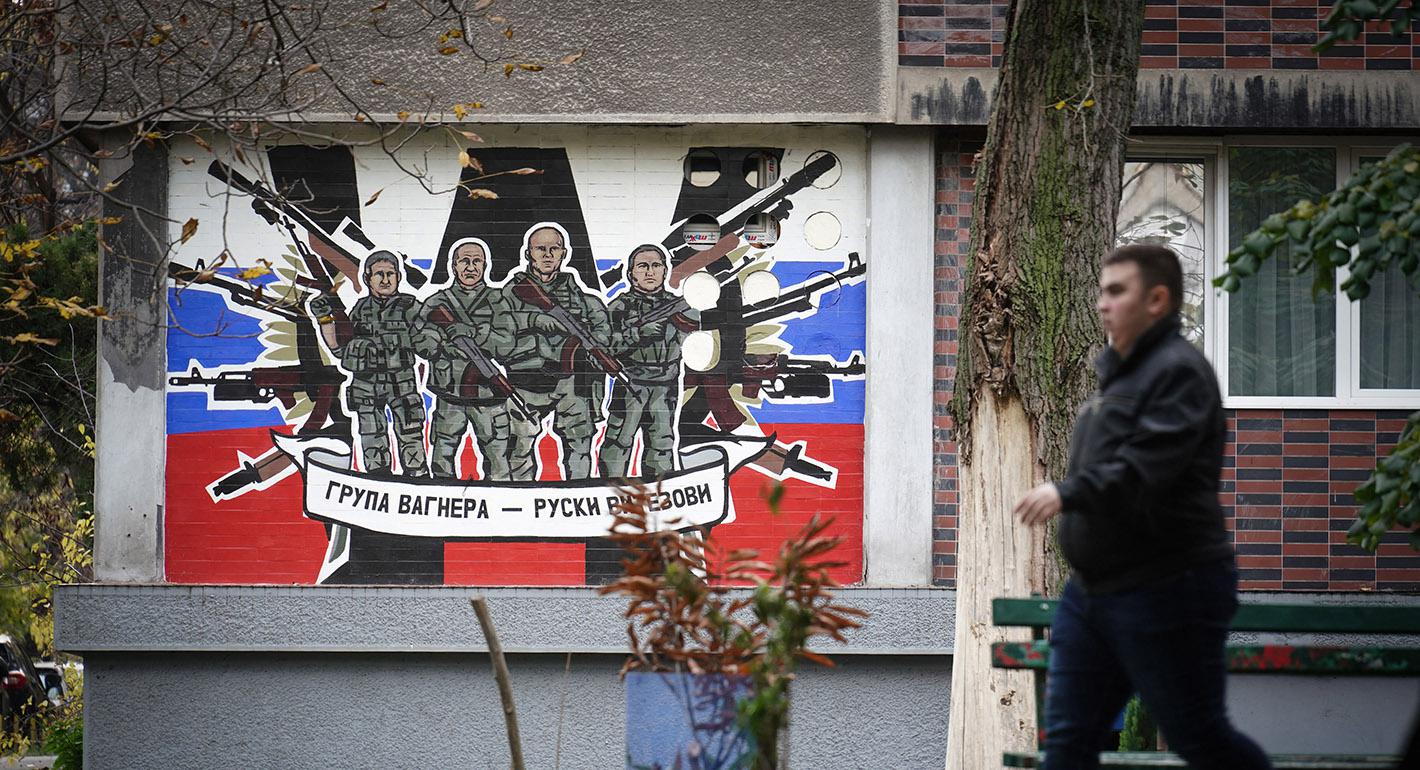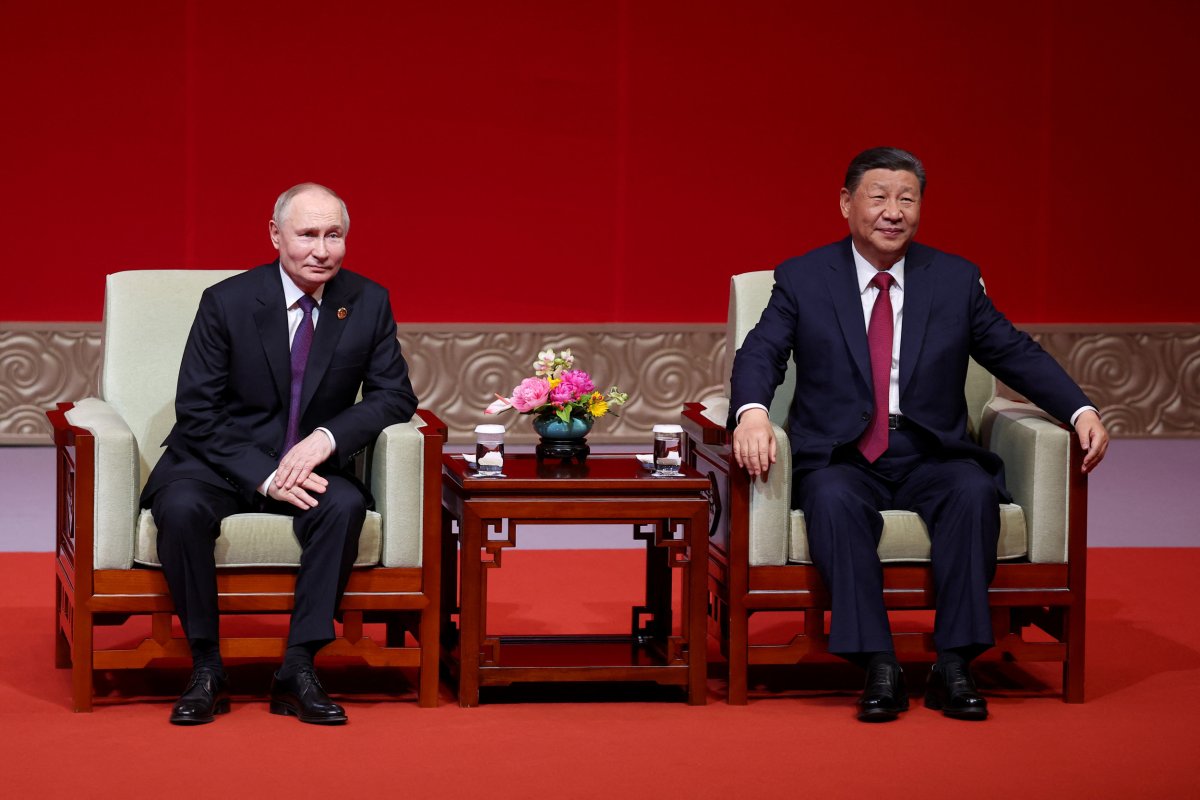
With reports that the infamous private military company Wagner was attempting to recruit Serbian volunteers to fight for Russia in Ukraine, Serbia’s controversial relationship with Russia is once again making international headlines. The news sparked alarm in Western capitals, which pressured Serbian President Aleksandar Vucic to put an immediate end to Wagner’s efforts.
Ostensibly, that pressure was successful. Vucic not only condemned Wagner’s activities, reiterating that mercenaries are illegal under Serbian law, but also publicly stated that Serbia does not support Russia’s invasion of Ukraine and considers Crimea and Donbas part of Ukraine. Such an outcome is widely being viewed as Belgrade’s long-awaited attempt to start distancing itself from Moscow and its brutal war. But is it?
As is often the case in Serbia’s relations with Russia, the standoff between Belgrade and Wagner was more about PR stunts and media coverage than real developments on the ground. Both sides skillfully manipulated popular stereotypes about the affinity between Russia and Serbia to their own ends and achieved the desired effect.
It is difficult to determine who initiated the whole story, but the media storm started to gather back in December 2022, when two right-wing Serbian activists visited the newly inaugurated Wagner headquarters in St. Petersburg. They represented tiny fringe groups consisting of just a few members, but the visit was apparently part of a propaganda campaign orchestrated by Wagner’s owner, the shady businessman Yevgeny Prigozhin.
He has always been keen to demonstrate that Wagner is capable of doing more than just fighting, and that it can also further Russia’s interests around the globe by other means if the Kremlin provides it with more powers and resources. The reception of two Serbs in St. Petersburg was publicized by media outlets also owned by Prigozhin with the aim of making the Russian leadership take notice of his efforts and growing international outreach.
The resulting publicity surpassed all expectations. Given Wagner’s international notoriety, a number of media misinterpreted the visit as a sign that Prigozhin was opening an office in Serbia to recruit volunteers to fight against Ukraine. The misinterpretation fitted the stereotype of Russian-Serbian brotherhood in arms so well that it persists to this day, despite having been refuted on numerous occasions. It was further bolstered in January by a few minor episodes that acquired disproportionate significance in the already charged atmosphere.
In early January, the Serbian version of the Russian propaganda mouthpiece RT ran an article openly promoting Wagner as an attractive employer. The text did not address Serbs directly and was soon rescinded, but still made waves. It was followed by news of several Serbian volunteers already training to fight in Ukraine, while on January 14 a mural celebrating Wagner appeared in Belgrade. It was painted over on the next day, but enough Wagner-related noise had built up in Serbia in the preceding weeks to secure the company’s activities a spot on the agenda of Vucic’s talks with Western diplomats.
The Serbian president appeared eager to react. He publicly reproached Russia for abusing his goodwill, and emphasized that Wagner was not welcome in Serbia, since the country had outlawed mercenary fighting. Dispelling any remaining doubts, Vucic stated that Belgrade does not support Moscow’s aggression against Ukraine and will not recognize Crimea, Donbas, or the other newly annexed Ukrainian territories as part of Russia. The strong statements of the Serbian leader were welcomed in the West and earned him favorable coverage in international media.
We should not, however, exaggerate either the courage required for Vucic to take such steps, or the impact they will have on Serbia’s relations with Russia. There is no evidence that Wagner was systematically targeting Serbs in its recruitment campaign, never mind establishing an office in the country. Given the ease with which Prigozhin has been recruiting Russian convicts into his private army, which is currently estimated to number 50,000 fighters, it makes little military sense for Wagner to invest in recruitment efforts in Serbia for the sake of a few dozen volunteers.
Causing a media stir appears to have been Prigozhin’s priority from the very beginning, and far from the Serbian leadership hindering him in that aim, it actually assisted him. Leading world media ran the story about Wagner expanding to the Balkans, allowing the businessman to show the Kremlin that his nimble company can bolster Russia’s international clout more efficiently than the bloated and corrupt state apparatus. Commenting on the scandal, Prigozhin refrained from his usual harsh language, instead respectfully stating that he holds no grudge against the Serbs, who are able to manage on their own.
The Kremlin is also unlikely to take offense at Vucic’s statements, since there is nothing new in them. Serbia prohibited its nationals from volunteering to fight in foreign conflicts back in 2015, reacting to reports about Serbian citizens fighting in Syria and Ukraine’s Donbas region. Since then, several dozen Serbs have been sentenced under that law, prompting no reaction from Russia. Why, then, would it be nettled by Vucic now, when he is simply maintaining the status quo?
The same is true of Vucic’s statements that Serbia respects the territorial integrity of Ukraine. This has been Belgrade’s official stance since Russia’s war with Georgia in 2008, repeatedly reiterated since the annexation of Crimea in 2014. Moscow is well aware of this position and has never objected to it, understanding that Serbia cannot afford to waver over the principle of territorial integrity in its ongoing attempts to prevent full recognition of its breakaway province of Kosovo.
Nor is Russia troubled by Vucic taking advantage of the scandal to portray himself to the West as a constructive pro-Western leader regrettably constrained by an unholy alliance between the Kremlin and Serbian right-wing radicals. Moscow understands perfectly that cooked-up “concessions” such as closing down the nonexistent Wagner office in Serbia help Vucic to evade Western pressure on more substantial issues, such as energy cooperation with Russia, joining in with anti-Russian sanctions, or recognition of Kosovo. Similar scandals in the past, when Vucic accused Moscow of stoking anti-Covid protests in 2020 or bribing a Serbian official in 2019, left no trace on the two countries’ relations.
There is no indication that the outcome of the Wagner row will be any different. There will be no arrests or crackdowns on pro-Russian groups in Serbia. On the contrary, the scandal has demonstrated how firmly they remain under Vucic’s thumb. RT Balkan swiftly rescinded the publication that had evoked the authorities’ ire, while the creators of the Wagner mural have made no attempts to replicate it since the first one was painted over. The pro-government tabloids will not tone down their rabid pro-Russian narratives: in any case, they gave only cursory attention to the Wagner story, which targeted Western audiences, not domestic ones.
The scandal has helped both countries to gain the kind of publicity they strived for without damaging their relations. Russia and Serbia will continue to utilize their cooperation for various propaganda purposes. Their readiness to treat each other’s needs with tolerance and understanding, along with their ability to prioritize issues of substance over PR stunts, are precisely what make this relationship so resilient.
Maxim Samorukov is currently a visiting fellow at the Belgrade Centre for Security Policy (BCSP) and a fellow at the Carnegie Endowment for International Peace. This article is also published with Carnegie Politika and with the weekly newspaper NiN (in Serbian).






